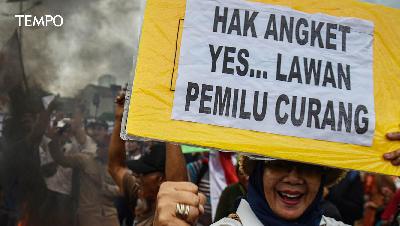Student Internship Fraud for Ferienjob Program in Germany
Monday, April 1, 2024
The police named five suspects for human trafficking through the ferienjob program in Germany. This is exploitation of student apprentices.
arsip tempo : 174572338022.

THE criminal investigation into human trafficking in relation to an internship program overseas shows the dark side of higher education in Indonesia. This experience should have been aimed at preparing students to enter the world of work, but instead became a means of exploiting them. The suspects had so much freedom to operate that they were able to persuade 33 state universities to take part in the program.
Jambi University economics lecturer Sihol Situngkir is one of the suspects. He is believed to have tricked a number of campuses into sending their students to work in Germany for three months as part of the ferienjob program. He was assisted by two lecturers from Jakarta State University and the directors of two travel agents, Sinar Harapan Bangsa and Cvgen Smart Consultant. They are accused of deceiving universities since 2022. As of the end of 2023, 1,047 students had joined the program.
The deception came to light after four students participating in the ferienjob program complained to the Indonesian Embassy in Berlin in October 2023. They said that they had run out of money because the company had not paid their promised salaries. It turned out that many other students had the same problem. Some of them had even fallen sick because they had been working too hard.
Right from when the program was introduced by Sihol in 2002, it was strange because it used the services of two agencies to find work for the students. These agencies had previously only supplied workers. They paid in advance for travel to a number of cities in Germany to the tune of Rp25 to 50 million per person. They recovered this cost using deductions from the student internship salaries. These students were also forced to sign contracts in German without seeing a translated version.
Given these irregularities, the decision by the Indonesian National Police Criminal Investigation Department to charge the five people under Law No. 21/2007 on the Eradication of Human Trafficking is right. Sending people to work overseas without special training as well as not paying their salaries are indications of human trafficking. In contrast to more usual types of fraud, human trafficking gives investigators the opportunity to charge all members of the network.
The ferienjob program itself is not illegal. The German government established it to give students an opportunity to earn extra money. The name comes from the German word ferien, meaning vacation. During the long holidays at the end of every year, students have an opportunity to work in private companies, in general doing physical work such as carrying boxes, packing, washing dishes in restaurant or carrying suitcases.
With these types of work, the ferienjob program is not relevant to the academic world. However, Sihol and the other suspects promoted it as part of the Freedom to Study-Independent Campus (MBKM) internship program implemented by Education, Culture, Research and Technology Minister Nadiem Makarim. They promised the program could be turned into academic credits using the semester credit unit system. But technically, the ferienjob program is not suitable because the long university holidays in Indonesia takes place in the middle of the year.
Because it is not in line with the student internship program, in October 2023, the Directorate-General of Higher Education banned campuses from enrolling their students in the ferienjob program. There is no conversion into semester credit units because ferienjob is a private sector program and there is no German government involvement. This cooperation with overseas companies ended with students being exploited.











